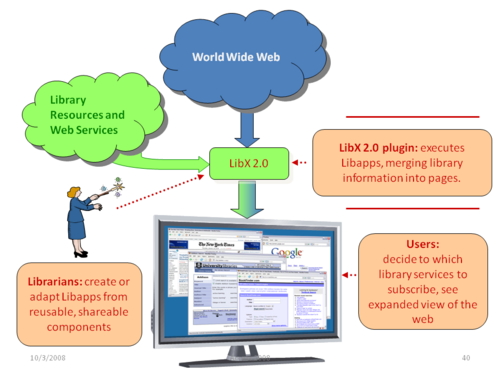Difference between revisions of "LibX Preconference"
(first draft) |
|||
| (11 intermediate revisions by 4 users not shown) | |||
| Line 1: | Line 1: | ||
== The LibX 2.0 Platform == | == The LibX 2.0 Platform == | ||
| − | [http://libx.org LibX] is a popular browser plugin for Firefox and Internet Explorer that has been adopted and customized by hundreds of libraries. Through its intuitive configuration interface, LibX can be customized by librarians even without programming skills. LibX can give libraries a presence on web pages to which they would not have access otherwise, allowing them to contextualize those web pages in a manner that is useful to and relevant for their users. As libraries compete with other online resources, extending the library's presence onto those sites becomes crucial. | + | [http://libx.org LibX] is a popular browser plugin for Firefox and Internet Explorer that has been adopted and customized by hundreds of libraries. Through its intuitive configuration interface, LibX can be customized by librarians even without programming skills. [[LibX]] can give libraries a presence on web pages to which they would not have access otherwise, allowing them to contextualize those web pages in a manner that is useful to and relevant for their users. As libraries compete with other online resources, extending the library's presence onto those sites becomes crucial. LibX 2.0 will provide a community platform for the development, sharing, and deployment of applications that will facilitate this presence. |
== Aims and Overview == | == Aims and Overview == | ||
| − | + | [[Image:Libx2overview.png|right|500px|The LibX 2.0 Platform]] | |
| − | + | This half-day preconference is targeted at developers who wish to use the LibX 2.0 platform to extend the reach of their services, or who wish to provide existing services in new contexts. | |
| − | Second, we'll present our architecture that allows the creation and publication of LibApps. We'll present the abstractions that explain how such applications are created and published. | + | First, we'll give an under-the-hood overview of how LibX works internally and how it maintains its configuration information. We'll briefly review how maintainers build and configure editions using the LibX Edition Builder. |
| + | |||
| + | Second, we'll present our architecture that allows the creation and publication of [[LibApps]]. LibApps are applications composed by librarians using modules that are created by developers. We'll present the abstractions that explain how such applications are created and published and the necessary API to develop and publish modules and LibApps. | ||
Third, we'll demonstrate a number of LibApps and show in detail how they are developed. | Third, we'll demonstrate a number of LibApps and show in detail how they are developed. | ||
| − | Lastly, we'll provide a collaborative space for participants to develop and deploy a LibApp of their own. | + | Lastly, we'll provide a collaborative space for participants to brainstorm about LibApps, and to develop and deploy a LibApp of their own. |
== Participants == | == Participants == | ||
| + | |||
| + | We envision a minimum number of 10 participants. To keep the size of the group workable, we would limit the number of participants at 25. | ||
| + | This is a half-day preconference. | ||
| + | |||
| + | == Presenters == | ||
* Godmar Back (Virginia Tech) | * Godmar Back (Virginia Tech) | ||
| − | * LibX Team | + | * Annette Bailey (Virginia Tech) |
| + | * LibX Team members | ||
Latest revision as of 07:29, 26 February 2009
The LibX 2.0 Platform
LibX is a popular browser plugin for Firefox and Internet Explorer that has been adopted and customized by hundreds of libraries. Through its intuitive configuration interface, LibX can be customized by librarians even without programming skills. LibX can give libraries a presence on web pages to which they would not have access otherwise, allowing them to contextualize those web pages in a manner that is useful to and relevant for their users. As libraries compete with other online resources, extending the library's presence onto those sites becomes crucial. LibX 2.0 will provide a community platform for the development, sharing, and deployment of applications that will facilitate this presence.
Aims and Overview
This half-day preconference is targeted at developers who wish to use the LibX 2.0 platform to extend the reach of their services, or who wish to provide existing services in new contexts.
First, we'll give an under-the-hood overview of how LibX works internally and how it maintains its configuration information. We'll briefly review how maintainers build and configure editions using the LibX Edition Builder.
Second, we'll present our architecture that allows the creation and publication of LibApps. LibApps are applications composed by librarians using modules that are created by developers. We'll present the abstractions that explain how such applications are created and published and the necessary API to develop and publish modules and LibApps.
Third, we'll demonstrate a number of LibApps and show in detail how they are developed.
Lastly, we'll provide a collaborative space for participants to brainstorm about LibApps, and to develop and deploy a LibApp of their own.
Participants
We envision a minimum number of 10 participants. To keep the size of the group workable, we would limit the number of participants at 25. This is a half-day preconference.
Presenters
- Godmar Back (Virginia Tech)
- Annette Bailey (Virginia Tech)
- LibX Team members
